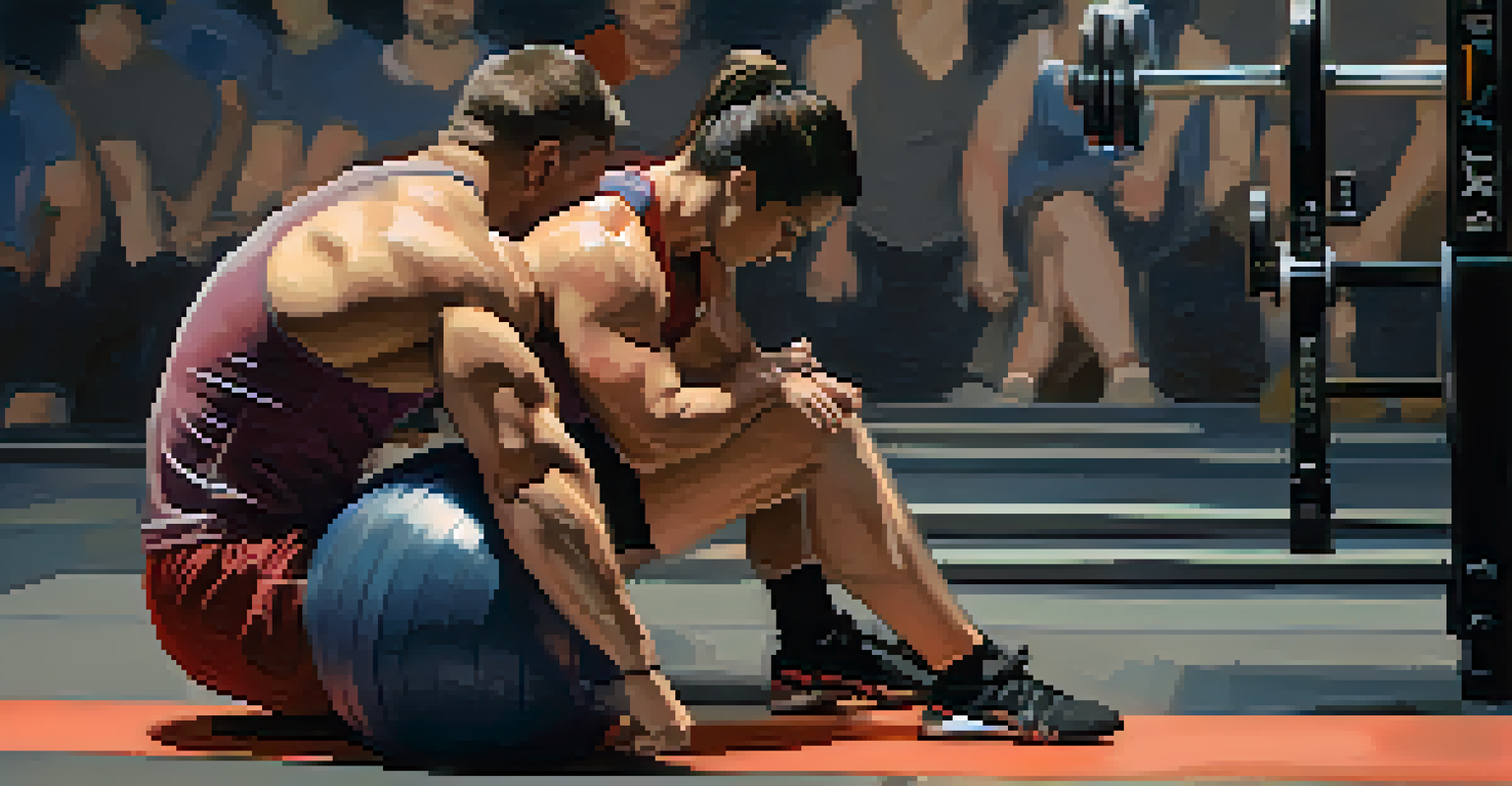How Coaches Help Overcome Mental Barriers in Powerlifting

Understanding Mental Barriers in Powerlifting
Mental barriers can significantly impact a powerlifter's performance. These barriers often manifest as fear, self-doubt, and anxiety, making it challenging for athletes to push their limits. For instance, a lifter might hesitate to attempt a new personal record due to the fear of failing, which can ultimately hinder their progress.
The only limits that exist are the ones you place on yourself.
Recognizing these barriers is the first step toward overcoming them. Coaches play a crucial role in helping athletes identify and understand their mental challenges. By fostering an open dialogue, coaches can help lifters articulate their fears and anxieties, setting the stage for targeted strategies to break through these obstacles.
Moreover, mental barriers are not just psychological; they can also stem from previous experiences, injuries, or even external pressures. Understanding the root causes allows coaches to tailor their approach, ensuring that athletes receive the support they need to navigate their mental hurdles effectively.
The Coach-Athlete Relationship: Building Trust
A strong coach-athlete relationship is foundational in overcoming mental barriers. Trust allows athletes to feel safe in expressing their fears and vulnerabilities. When athletes trust their coaches, they are more likely to embrace the strategies suggested to them, whether it's visualization techniques or specific training regimens.

This relationship is built over time through consistent communication and mutual respect. Coaches who actively listen and show empathy create an environment where athletes feel valued and understood. This sense of belonging can significantly reduce anxiety and foster a more positive mindset during training and competition.
Overcoming Mental Barriers
Identifying and addressing mental barriers like fear and self-doubt is crucial for powerlifters to enhance their performance.
Additionally, coaches can share their own experiences with mental barriers, making the process relatable. By acknowledging that everyone faces challenges, coaches help normalize the conversation around mental health in powerlifting, encouraging athletes to confront their barriers head-on.
Setting Realistic Goals with Coaches
Goal setting is a powerful tool in overcoming mental barriers. Coaches work with athletes to establish realistic, achievable goals that can boost confidence and motivation. For example, instead of aiming for a massive increase in weight right away, a coach might suggest small, incremental targets that are more attainable, which can help build momentum.
Success is not final, failure is not fatal: It is the courage to continue that counts.
By breaking down larger goals into smaller milestones, athletes can celebrate their progress along the way. This sense of accomplishment reinforces their belief in their abilities, gradually diminishing self-doubt. Each small win encourages athletes to tackle bigger challenges with renewed confidence.
Moreover, a coach can help athletes understand that setbacks are a natural part of the process. By framing obstacles as learning experiences rather than failures, athletes can develop resilience and a growth mindset, essential for thriving in the competitive world of powerlifting.
Utilizing Mental Techniques to Build Confidence
Coaches often introduce mental techniques to help athletes enhance their performance. Visualization, for instance, allows lifters to mentally rehearse their lifts, creating a positive mental image of success. This practice can significantly reduce anxiety and increase confidence during actual lifts.
Another commonly used technique is positive self-talk, where coaches encourage athletes to replace negative thoughts with empowering affirmations. Instead of thinking, 'I can't lift this,' athletes learn to say, 'I am strong and capable.' This shift in mindset can make a world of difference in an athlete's performance.
Building Trust with Coaches
A strong coach-athlete relationship fosters trust, allowing athletes to share their vulnerabilities and embrace strategies to overcome challenges.
Coaches also emphasize the importance of mindfulness and focus during training. Techniques like deep breathing and grounding exercises can help athletes stay present and calm, especially during high-pressure situations like competitions. These skills not only improve performance but also promote overall mental well-being.
Creating a Supportive Training Environment
A supportive training environment is vital for overcoming mental barriers. Coaches play a key role in fostering a culture of encouragement and positivity within the gym. When athletes feel supported by their peers and coaches, they are more likely to take risks and attempt heavier lifts without the fear of judgment.
This environment can be cultivated through team-building activities and group training sessions. Coaches can encourage camaraderie among athletes, creating a sense of community where everyone motivates each other. This collective support can be a game-changer, especially on tough training days.
Additionally, coaches can incorporate feedback sessions where athletes share their experiences and challenges. This open forum not only helps athletes feel heard but also allows them to learn from one another, building a network of support that extends beyond the gym.
Handling Competition Anxiety with Coaching Strategies
Competition anxiety is a common hurdle for many powerlifters. Coaches can equip athletes with strategies to manage this anxiety effectively. For example, familiarizing athletes with the competition environment during training can reduce fear and uncertainty when it's time to perform.
Coaches may also help athletes establish a pre-lift routine that calms nerves and focuses their energy. This routine can include specific warm-ups, breathing exercises, or even listening to motivational music. Having a reliable plan in place can empower athletes, helping them feel more in control when it counts the most.
Setting Achievable Goals
Establishing realistic, incremental goals helps athletes build confidence and resilience, enabling them to tackle bigger challenges in powerlifting.
Moreover, coaches can provide reassurance and reinforce the idea that they have prepared adequately for the competition. Reminding athletes of their hard work and successes can boost their confidence, allowing them to approach the competition with a positive mindset rather than fear.
The Long-Term Benefits of Coaching in Powerlifting
The benefits of coaching in powerlifting extend well beyond immediate performance improvements. Coaches help athletes develop mental resilience and coping strategies that serve them in various aspects of life. The skills learned through overcoming mental barriers can translate to personal and professional challenges as well.
Additionally, athletes who work closely with coaches often find that their self-discipline and focus improve. These qualities not only enhance their performance but also foster a strong work ethic that can lead to success in other endeavors. The journey of powerlifting becomes a powerful metaphor for tackling life's challenges head-on.

Ultimately, the relationship between coaches and athletes creates a lasting impact. Through guidance, support, and shared experiences, athletes learn to view their mental barriers as opportunities for growth. This shift in perspective can empower them to pursue their goals with confidence, both on and off the platform.